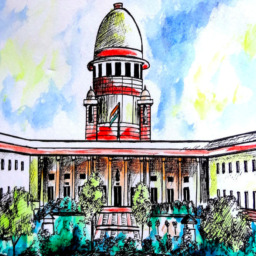INTRODUCTION
The framers of the Constitution at the time of independence rightly conceived the need to uplift the disadvantaged sections of society through education and employment opportunities. Dr B.R. Ambedkar incorporated reservation in our constitution to curtail social injustices and achieve equality in society, hence granted specific rights to the oppressed groups such as SCs, STs etc. Reservation was initially only available to SCs and STs, but after the Mandal Commission report was implemented in 1987, it was extended to OBCs as well.
As States are primarily responsible for the welfare of the people who live under their domain, the 105th Constitution Amendment has been notified on August 19, 2021. Its objective is to give states back their authority to specify socially and educationally backward classes (OBSs). The Amendment was essential to overturn Supreme Court ruling in Maratha reservation judgement that- After Parliament passed the 102nd Amendment, states were deprived of their power to include or exclude communities from the ‘Backward Classes’ list.
OBCs and reservation – Historical Background
Reservation is an initiative to achieve educational, economic, and social equality and justice. In addition, the Right to Equality enshrined in Articles 15 and 16 of the Indian Constitution strives to realize the vision of India’s Constitution framers to provide “comprehensive growth to the People of India”. India’s reservation system was revamped when the Mandal Commission led by B.P. Mandal proposed that Other Backward Classes (OBCs) must be included in the reservation system.
In the past, OBCs were on the bottom rung of the caste system. Hence the major obstacle in their development is socio-economic backwardness. Various commissions were formed to assess their backwardness and determine the backward groups which are left substantially behind in the sphere of public welfare. In this perspective, we will analyse the 105th Constitutional Amendment Act, 2021.
States lose power to identify SEBC – 102nd Constitutional Amendment
The OBCs were given a strong foothold by the 102nd amendment in 2017, which ensured the institutionalization of reservation systems. It awarded the National Commission for Backward Communities (NCBC) constitutional status in 2017, making it the primary institution for dealing with matters concerning OBCs. The 102nd Constitution Amendment Act of 2018 also introduced Articles 338B and 342A.[1]
The newly established National Commission for Backward Classes is governed under Article 338-B, which outlines its structure, functions, and powers.
According to Article 342A – “the president, in consultation with the governor, would identify the socially and educationally backward classes”. It states that it is subject to the Parliament to include or exclude a community to grant reservation benefits from the Central List of socially and educationally backward classes.
However, there have been several issues in the recent past about the inclusion/exclusion of communities from the OBC list, one of them was the quest for OBC status for the Maratha community in Maharashtra which sparked a significant turn in the events that followed.
Maratha Reservation Judgement
In the Maratha reservation judgement, the Maharashtra Assembly passed a bill in 2017 seeking a 16 % reservation for the Maratha community. While upholding the quota in 2018, the Bombay High Court stated that instead of 16 %, it should be lowered to 12 % in education and 13 % in jobs. A petition was filled and it was challenged that the reservation violated a 1992 Supreme Court ruling in the Indira Sawhney case, which stated that reservations in any state could not exceed 50%.
“The Maharashtra State Reservation for Socially and Educationally Backward Classes (SEBC) Act’ 2018” was declared unconstitutional by the Supreme Court’s Constitutional Bench in May of this year for the reason as below:
- This reservation had increased the State’s quota ceiling by more than 50%.
- After the 102nd Constitutional Amendment, states have lost their power to identify SEBCs, and this power was transferred to the President of India[2].
The Supreme Court’s majority decision upheld the 102nd Constitutional Amendment Act but said that the president has the power to decide which communities would be placed on the state OBC list based on the recommendations of the National Commission for Backward Classes (NCBC). This means that only the Centre has the authority to recognize SEBC and place them in the Central List. States can only give suggestions to the President or statutory bodies about which castes and communities should be included, excluded, or modified in the SEBC List.
Why is Amendment Needed?
Due to the Maratha reservation judgment, the Centre is in a strange predicament as it is the states which are primarily responsible for the welfare of the people within their dominion. The Union government had strenuously asserted in court that neither the Centre nor Parliament intent to deprive the states of their authority to identify SEBCs. The phrase ‘Central List’ signified that what the President announced was a list of backward classes for the purposes of the Central government and its instrumentalities, and that it had no bearing on the lists kept by the States. Opposition parties accused the Centre of passing a faulty law that led to the court coming up with this decision. Since there was widespread political agreement that the Supreme Court’s interpretation needed to be overturned by legislation, it was agreed to amend the Constitution once again to define the role of the state in identifying SEBCs. The Constitution (105th Amendment) Act of 2021 was hence passed.[3]
The amendment is required to reinstate state governments’ authority to maintain a state list of OBCs, which was taken away by a Supreme Court ruling. “Nearly 671 OBC communities would lose access to reservations in educational institutions and appointments if the state list was abolished”. This would have a detrimental effect on roughly one-fifth of the OBC population.
Analysis of 105th Constitutional Amendment
The main objective of the 127th Amendment Bill is that states can maintain the “state list” of OBCs, as was the case before the Supreme Court ruling. Socially and educationally backward classes are defined in Article 366 (26c). According to the proposed Bill, the president’s authority over the “state list” would be completely taken away, and the list will be notified by the state Assembly.
The amendment allows the NCBC to be consulted by states on matters involving OBCs. It’s a significant amendment for a variety of reasons. To begin with, this amendment authorizes state governments to add communities to the OBC lists if they deem it necessary. This provision is crucial because it permits OBC reservation benefits to reach the lowest strata of society. Second, it strengthens the NCBC’s position by requiring states to consult with this constitutional body on all matters concerning OBCs. Furthermore, this amendment must be viewed in the context of the OBC reservation’s evolution from ad hocism in the early days to the greater institutionalization of mechanisms that deal with OBC issues, ranging from the NCBC’s constitutional status to states’ concrete role in maintaining their OBC lists. More clarity in this regard is a positive development, as it would only enhance the welfare provisions enshrined in the Indian Constitution for the weaker sections of our society.
The outcome of 127th Constitutional Amendment Bill
The 127th Constitution Amendment Bill has far-reaching implications. To some degree, reservation is a policy followed by the government to rectify historical injustices perpetrated by the so-called “upper castes” against the lower castes. Many “lower castes” in India were separated from the mainstream by the caste system, which hampered their growth. The consequences are still being felt to a large extent.
The importance of this constitutional amendment indicates the greater need for development and progress in our society, a growth that would reach every Indian individual, obviating the necessity for reservation. The fact that many groups require OBC classification is linked to the notion that India still has a lot of room for societal development after 74 years of independence. This is a disturbing reality that requires further reflection and policy development.[4]
Conclusion
Reservation can be used as a measure of positive discrimination to change the social order in favour of those who have been exploited over generations. More significantly, the justice that such laws provide will ensure social equality and, in the long run, may even change the composition of our country’s elites.
Finally, the Constitution Amendment Bill has added a great deal of clarity to the standard operating procedures for the OBC reservation system. It also has the ability to empower individuals from underdeveloped communities by improving their social standing via better education and job possibilities, opening the path for more inclusive development. The 127th Constitution Amendment Bill will be able to bridge the increasing chasm of destitution and poverty amid COVID-19 and economic challenges. It will guarantee that communities who slip through the gaps of our country’s development discourse are represented and empowered.
Author(s) Name: Vaishnavi Chandrakar (Hidayatullah National Law University, Raipur)
References:
[1] ‘Amendment Acts 102 To Onwards |Legislative Department | Ministry Of Law And Justice | Goi’ (Legislative.gov.in, 2021) <https://legislative.gov.in/amendment-acts-102-to-onwards> accessed 4 September 2021
[2] Jaishri Laxmanrao Patil v. Union of India [2021] SLP (C) 15737/2019 [ (Supreme Court of India).
[3] ‘Explained | How Was the Backward Classes Policy Restored?’ (The Hindu, 2021) <https://www.thehindu.com/news/national/how-was-the-backward-classes-policy-restored/article36159057.ece> accessed 4 September 2021.
[4] “Anuja D, ‘127Th Amendment Bill, 2021: The Path To Inclusive Development’ (Times of India Blog, 2021) <https://timesofindia.indiatimes.com/blogs/voices/127th-amendment-bill-2021-the-path-to-inclusive-development/> accessed 8 September 2021”
















